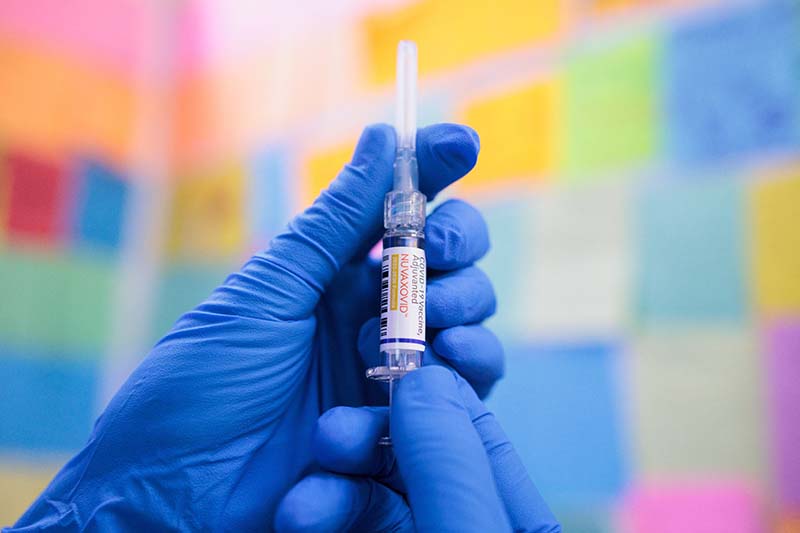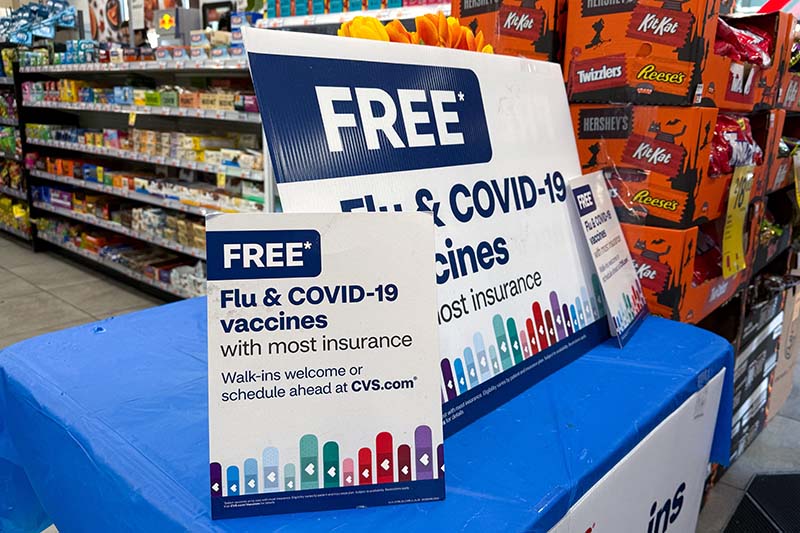WASHINGTON (OSV News) — Amid policy changes governing their use, and as research suggests promising new uses for messenger RNA, or mRNA, vaccine technology, COVID-19 vaccines have become available ahead of cold and flu season.
An infectious diseases specialist, who is also a Catholic deacon, shared with OSV News how Catholics can appreciate vaccines and mRNA technology through both the lens of science and the church’s own moral teaching.
Researchers at Texas, Florida universities
A new retrospective study by researchers at the University of Texas MD Anderson Cancer Center and the University of Florida found that patients with non-small-cell lung cancer and melanoma, a type of skin cancer, who also got a Pfizer or Moderna shot within 100 days of starting treatment, lived longer than those who did not. Researchers said they found that it had nothing to do with virus infections, but rather the molecule in those specific vaccines, mRNA, which appeared to help the immune system respond better to the treatment.
“MRNA technology is extraordinary and very powerful,” Dr. Timothy Flanigan, a hospital doctor in Brown Medicine’s Infectious Diseases Division, who also teaches at Brown Medical School and is a permanent deacon in the Diocese of Providence, Rhode Island, told OSV News just prior to the release of that study.
The mRNA vaccines developed to fight COVID-19 during the pandemic, he said, “did have a very important impact in decreasing hospitalizations, severe pneumonia and death,” adding, “We’re still learning a lot about it, and it produces a potent immune response.”
COVID vaccines in U.S.
Most of the vaccines available for COVID-19 in the U.S. use mRNA technology. The one exception in the U.S. is Novavax vaccine, which is a protein-based vaccine.
The study comes after the Centers for Disease Control and Prevention’s Advisory Committee on Immunization Practices , or ACIP, under the Department of Health and Human Services, changed its guidance on COVID-19 vaccines, shifting away from a universal COVID-19 vaccine recommendation for most people 6 months and older to individuals 65 years of age or older or in particular risk categories.
However, ACIP also said COVID-19 vaccination for everyone 6 months or older will be based on what it called “individual decision-making” after consultation with a health care provider, known as “shared clinical decision-making,” which it said includes physicians, registered nurses and pharmacists.
Vaccinations and vulnerable groups
The recommendations do differ from some other developed nations, although they also emphasize the importance of vaccinating vulnerable groups.
Italy, which was among the places that had high rates of infection during the height of the pandemic, under the European Medicines Agency (EMA), defined risk categories to include those over the age of 60, residents of long-term care facilities, pregnant or postpartum women, health and social care workers, or those with other conditions including respiratory, cardiovascular, neurological or metabolic diseases. It also recommended vaccination for the family members, households or caregivers of those with risk factors.
“COVID is a tough adversary,” Flanigan said when asked about the shift in HHS policy.
A ‘risk-benefit’ calculation
Flanigan said that while it is appropriate to think of COVID-19 vaccination as a “risk-benefit” calculation, people in certain risk categories are more vulnerable to the virus, and the vaccine “decreases the chance of hospitalization.”

Regarding the policy change, he stressed, “My hope is that it doesn’t lead to vaccine skepticism or vaccine hesitancy overall.”
“The benefits we’ve seen from childhood vaccinations are absolutely incredible,” he said.
During the height of the COVID-19 pandemic in 2020 and 2021, shortly before vaccines first became available to the general American public, the Holy See’s Congregation (now Dicastery) for the Doctrine of the Faith, Catholic bishops and theologians all released statements that the COVID-19 vaccines were morally permissible for Catholics to receive.
Seeking some vaccine brands over others
Those statements varied only slightly, as the U.S. bishops encouraged Catholics, where they had such a choice, to seek some brands of vaccines over others due to the varying degrees of remote connection to cell lines derived originally from several unborn children aborted in the mid-20th century, such as the HEK-293 fetal cell line.
Neither the Pfizer or Moderna COVID-19 vaccines used those cell lines for producing their mRNA vaccines; however, they did involve testing using HEK-293 cell line, which has been commonly used in testing a vast array of modern drugs, such as Advil, Ivermectin and Tums. Novavax did not use fetal cell lines in either the production or testing of its COVID-19 vaccine.
Vaccines, including those currently produced using cell lines derived from the tissue of unborn children aborted decades ago, do not contain fetal cells in the final product. The cell lines in current use are not the same as fetal tissue as they were developed in a laboratory over the course of decades. Almost all cells die after they have divided a certain number of times, a phenomenon scientists call the Hayflick limit.
Vaccinations should be voluntary
The 2020 statement from the Congregation (now Dicastery) for the Doctrine of the Faith said that while Catholics can morally undergo vaccination for COVID-19, that decision should be voluntary, not compulsory.
The statement said that while any connection to abortion was remote, “the licit use of such vaccines does not and should not in any way imply that there is a moral endorsement of the use of cell lines proceeding from aborted fetuses. Both pharmaceutical companies and governmental health agencies are therefore encouraged to produce, approve, distribute, and offer ethically acceptable vaccines that do not create problems of conscience for either health care providers or the people to be vaccinated.”
That statement added, “From the ethical point of view, the morality of vaccination depends not only on the duty to protect one’s own health, but also on the duty to pursue the common good. In the absence of other means to stop or even prevent the epidemic, the common good may recommend vaccination, especially to protect the weakest and most exposed.”
COVID-19 vaccines are available in all 50 states, but eligibility may vary by state or county.
Kate Scanlon is a national reporter for OSV News covering Washington. Follow her on X @kgscanlon.




